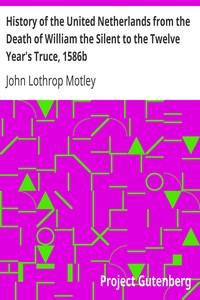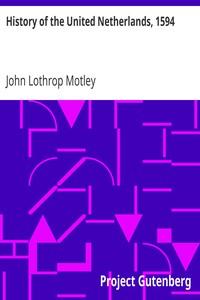|
|
Read this ebook for free! No credit card needed, absolutely nothing to pay.Words: 20734 in 5 pages
This is an ebook sharing website. You can read the uploaded ebooks for free here. No credit cards needed, nothing to pay. If you want to own a digital copy of the ebook, or want to read offline with your favorite ebook-reader, then you can choose to buy and download the ebook.

: History of the United Netherlands 1586c by Motley John Lothrop - Netherlands History Eighty Years' War 1568-1648@FreeBooksTue 06 Jun, 2023 Edition: 10 HISTORY OF THE UNITED NETHERLANDS From the Death of William the Silent to the Twelve Year's Truce--1609 History of the United Netherlands, 1586 Military Plans in the Netherlands--The Elector and Electorate of Cologne--Martin Schenk--His Career before serving the States-- Franeker University founded--Parma attempts Grave--Battle on the Meuse--Success and Vainglory of Leicester--St. George's Day triumphantly kept at Utrecht--Parma not so much appalled as it was thought--He besieges and reduces Grave--And is Master of the Meuse-- Leicester's Rage at the Surrender of Grave--His Revenge--Parma on the Rhine--He besieges aid assaults Neusz--Horrible Fate of the Garrison and City--Which Leicester was unable to relieve--Asel surprised by Maurice and Sidney--The Zeeland Regiment given to Sidney--Condition of the Irish and English Troops--Leicester takes the Field--He reduces Doesburg--He lays siege to Zutphen--Which Parma prepares to relieve--The English intercept the Convoy--Battle of Warnsfeld--Sir Philip Sidney wounded--Results of the Encounter-- Death of Sidney at Arnheim--Gallantry of Edward Stanley. Five great rivers hold the Netherland territory in their coils. Three are but slightly separated--the Yssel, Waal, and ancient Rhine, while the Scheldt and, Meuse are spread more widely asunder. Along each of these streams were various fortified cities, the possession of which, in those days, when modern fortification was in its infancy, implied the control of the surrounding country. The lower part of all the rivers, where they mingled with the sea and became wide estuaries, belonged to the Republic, for the coasts and the ocean were in the hands of the Hollanders and English. Above, the various strong places were alternately in the hands of the Spaniards and of the patriots. Thus Antwerp, with the other Scheldt cities, had fallen into Parma's power, but Flushing, which controlled them all, was held by Philip Sidney for the Queen and States. On the Meuse, Maastricht and Roermond were Spanish, but Yenloo, Grave, Meghem, and other towns, held for the commonwealth. On the Waal, the town of Nymegen had, through the dexterity of Martin Schenk, been recently transferred to the royalists, while the rest of that river's course was true to the republic. The Rhine, strictly so called, from its entrance into Netherland, belonged to the rebels. Upon its elder branch, the Yssel, Zutphen was in Parma's hands, while, a little below, Deventer had been recently and adroitly saved by Leicester and Count Meurs from falling into the same dangerous grasp. Thus the triple Rhine, after it had crossed the German frontier, belonged mainly, although not exclusively, to the States. But on the edge of the Batavian territory, the ancient river, just before dividing itself into its three branches, flowed through a debatable country which was even more desolate and forlorn, if possible, than the land of the obedient Provinces. This unfortunate district was the archi-episcopal electorate of Cologne. The city of Cologne itself, Neusz, and Rheinberg, on the river, Werll and other places in Westphalia and the whole country around, were endangered, invaded, ravaged, and the inhabitants plundered, murdered, and subjected to every imaginable outrage, by rival bands of highwaymen, enlisted in the support of the two rival bishops--beggars, outcasts, but high-born and learned churchmen both--who disputed the electorate. At the commencement of the year a portion of the bishopric was still in the control of the deposed Protestant elector Gebhard Truchsess, assisted of course by the English and the States. The city of Cologne was held by the Catholic elector, Ernest of Bavaria, bishop of Liege; but Neusz and Rheinberg were in the hands of the Dutch republic. The military operations of the year were, accordingly, along the Meuse, where the main object of Parma was to wrest Grave From the Netherlands; along the Waal, where, on the other hand, the patriots wished to recover Nymegen; on the Yssel, where they desired to obtain the possession of Zutphen; and in the Cologne electorate, where the Spaniards meant, if possible, to transfer Neusz and Rheinberg from Truchsess to Elector Ernest. To clear the course of these streams, and especially to set free that debatable portion of the river-territory which hemmed him in from neutral Germany, and cut off the supplies from his starving troops, was the immediate design of Alexander Farnese. Nothing could be more desolate than the condition of the electorate. Ever since Gebhard Truchsess had renounced the communion of the Catholic Church for the love of Agnes Mansfeld, and so gained a wife and lost his principality, he had been a dependant upon the impoverished Nassaus, or a supplicant for alms to the thrifty Elizabeth. The Queen was frequently implored by Leicester, without much effect, to send the ex-elector a few hundred pounds to keep him from starving, as "he had not one groat to live upon," and, a little later, he was employed as a go-between, and almost a spy, by the Earl, in his quarrels with the patrician party rapidly forming against him in the States. At Godesberg--the romantic ruins of which stronghold the traveller still regards with interest, placed as it is in the midst of that enchanting region where Drachenfels looks down on the crumbling tower of Roland and the convent of Nonnenwerth--the unfortunate Gebhard had sustained a conclusive defeat. A small, melancholy man, accomplished, religious, learned, "very poor but very wise," comely, but of mean stature, altogether an unlucky and forlorn individual, he was not, after all, in very much inferior plight to that in which his rival, the Bavarian bishop, had found himself. Prince Ernest, archbishop of Liege and Cologne, a hangeron of his brother, who sought to shake him off, and a stipendiary of Philip, who was a worse paymaster than Elizabeth, had a sorry life of it, notwithstanding his nominal possession of the see. He was forced to go, disguised and in secret, to the Prince of Parma at Brussels, to ask for assistance, and to mention, with lacrymose vehemence, that both his brother and himself had determined to renounce the episcopate, unless the forces of the Spanish King could be employed to recover the cities on the Rhine. If Neusz and Rheinberg were not wrested from the rebels; Cologne itself would soon be gone. Ernest represented most eloquently to Alexander, that if the protestant archbishop were reinstated in the ancient see, it would be a most perilous result for the ancient church throughout all northern Europe. Parma kept the wandering prelate for a few days in his palace in Brussels, and then dismissed him, disguised and on foot, in the dusk of the evening, through the park-gate. He encouraged him with hopes of assistance, he represented to his sovereign the importance of preserving the Rhenish territory to Bishop Ernest and to Catholicism, but hinted that the declared intention of the Bavarian to resign the dignity, was probably a trick, because the archi-episcopate was no such very bad thing after all. The archi-episcopate might be no very bad thing, but it was a most uncomfortable place of residence, at the moment, for prince or peasant. Overrun by hordes of brigands, and crushed almost out of existence by that most deadly of all systems of taxations, the 'brandschatzung,' it was fast becoming a mere den of thieves. The 'brandschatzung' had no name in English, but it was the well-known impost, levied by roving commanders, and even by respectable generals of all nations. A hamlet, cluster of farm-houses, country district, or wealthy city, in order to escape being burned and ravaged, as the penalty of having fallen into a conqueror's hands, paid a heavy sum of ready money on the nail at command of the conqueror. The free companions of the sixteenth century drove a lucrative business in this particular branch of industry; and when to this was added the more direct profits derived from actual plunder, sack, and ransoming, it was natural that a large fortune was often the result to the thrifty and persevering commander of free lances. Free books android app tbrJar TBR JAR Read Free books online gutenberg More posts by @FreeBooks
: History of the United Netherlands from the Death of William the Silent to the Twelve Year's Truce 1586c by Motley John Lothrop - Netherlands History Eighty Years' War 1568-1648@FreeBooksTue 06 Jun, 2023

: History of the United Netherlands from the Death of William the Silent to the Twelve Year's Truce 1586b by Motley John Lothrop - Netherlands History Eighty Years' War 1568-1648@FreeBooksTue 06 Jun, 2023
|
Terms of Use Stock Market News! © gutenberg.org.in2025 All Rights reserved.






